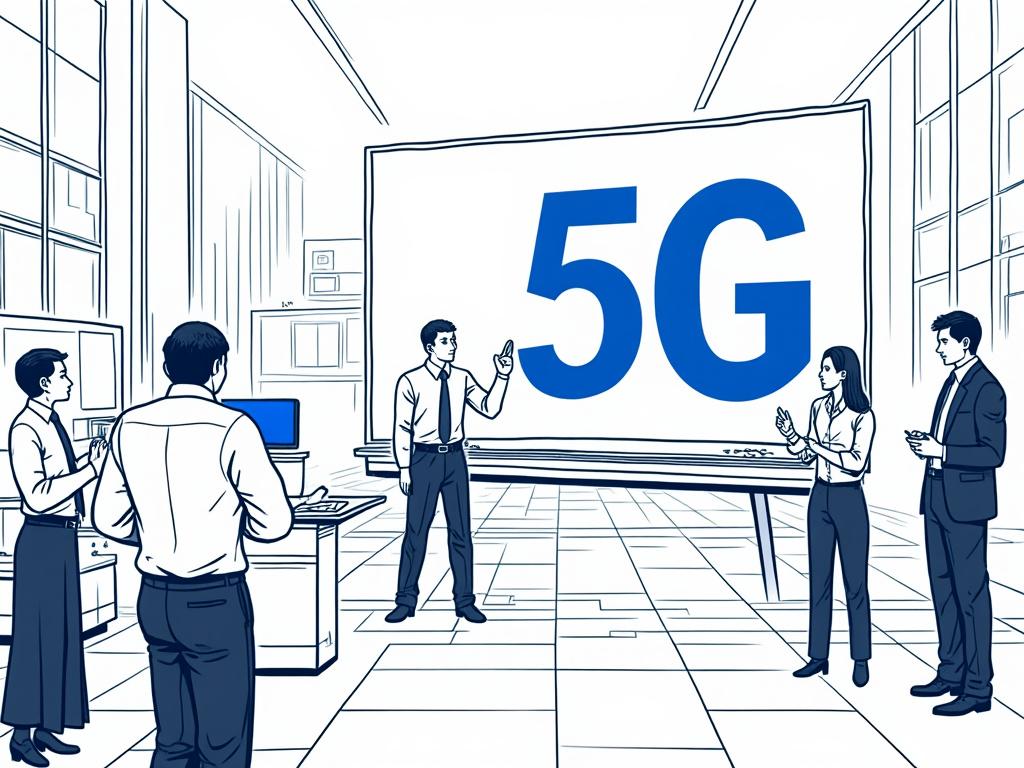
5G Revolution in Greece: Transforming Mobile Technology and Digital Infrastructure
Reading time: 8 minutes
Table of Contents
- Current State of 5G Deployment in Greece
- Major Network Operators and Their Strategies
- Coverage Analysis and Performance Metrics
- Implementation Challenges and Solutions
- Economic Impact and Investment Opportunities
- Greece’s Digital Transformation Roadmap
- Frequently Asked Questions
Current State of 5G Deployment in Greece
Ever wondered why your mobile internet feels lightning-fast in some Greek cities but sluggish in others? The answer lies in Greece’s ambitious yet challenging 5G rollout journey that’s reshaping the nation’s digital landscape.
Greece officially launched commercial 5G services in December 2021, making it one of the last EU countries to embrace this revolutionary technology. However, what the country lacks in timing, it’s making up for in strategic implementation and targeted investment approaches.
Key Deployment Milestones
The Greek telecommunications landscape has undergone dramatic transformation since the first 5G towers went live. Here’s what’s actually happening on the ground:
- Urban Coverage Priority: Athens and Thessaloniki achieved 70% 5G coverage by mid-2023
- Tourist Destination Focus: Major islands like Santorini and Mykonos received priority deployment
- Industrial Integration: Port of Piraeus became Greece’s first fully 5G-enabled logistics hub
- Rural Connectivity Gap: Approximately 40% of rural areas still lack reliable 5G access
Real-World Performance Metrics
Let’s cut through the marketing hype and examine actual performance data. According to Ookla’s Speedtest Intelligence, Greek 5G networks deliver median download speeds of 187 Mbps – significantly higher than the EU average of 156 Mbps, but still trailing Nordic countries.
5G Speed Comparison: Greece vs EU Neighbors
Major Network Operators and Their Strategies
Greece’s 5G ecosystem is dominated by three major players, each pursuing distinct approaches that directly impact user experience and coverage quality.
Cosmote: The Market Leader’s Aggressive Expansion
Cosmote, Greece’s largest telecom operator, has invested over €350 million in 5G infrastructure since 2020. Their strategy focuses on dense urban coverage combined with strategic rural expansion.
“Our goal isn’t just speed – it’s creating a foundation for Greece’s digital economy transformation,” explains Cosmote CEO Petros Koukoulis. The company has deployed over 1,200 5G base stations nationwide, with ambitious plans to reach 2,500 by end of 2024.
Vodafone Greece: Innovation-Driven Approach
Vodafone has taken a different path, prioritizing quality over quantity. Their 5G network covers fewer locations but delivers consistently higher performance metrics. Key differentiators include:
- First to deploy standalone 5G architecture in Greece
- Partnership with Ericsson for advanced network slicing capabilities
- Focus on enterprise and B2B solutions
Wind Hellas: The Challenger’s Smart Strategy
As the smallest major operator, Wind has pursued strategic partnerships and targeted investments. Their collaboration with Nokia has enabled rapid deployment in mid-tier cities, often overlooked by larger competitors.
| Operator | 5G Base Stations | Population Coverage | Average Speed (Mbps) | Investment (2020-2024) |
|---|---|---|---|---|
| Cosmote | 1,200+ | 65% | 195 | €350M |
| Vodafone | 850+ | 52% | 210 | €280M |
| Wind Hellas | 620+ | 41% | 178 | €180M |
Coverage Analysis and Performance Metrics
Understanding Greece’s 5G coverage requires looking beyond marketing claims to examine real-world accessibility and performance patterns.
Urban vs Rural Divide: The Connectivity Challenge
Quick scenario: Imagine you’re a digital nomad considering Greece for remote work. Where can you actually rely on consistent 5G connectivity?
Tier 1 Cities (Excellent Coverage):
- Athens Metropolitan Area: 85% coverage, average 200+ Mbps
- Thessaloniki: 78% coverage, average 185+ Mbps
- Patras: 65% coverage, average 170+ Mbps
Tourist Destinations (Seasonal Optimization):
Greek operators have intelligently prioritized tourist hotspots, recognizing the economic importance of reliable connectivity for international visitors. Santorini, despite its remote location, now boasts better 5G coverage than many mainland cities.
Rural Areas (The Ongoing Challenge):
Here’s the straight talk: Rural 5G deployment remains Greece’s biggest telecommunications challenge. Mountainous terrain, dispersed populations, and infrastructure costs create significant barriers. However, EU funding programs are accelerating rural connectivity projects.
Industry-Specific Performance Applications
Greece’s 5G networks are enabling transformative applications across key economic sectors:
Tourism Technology Revolution: Hotels in Crete are implementing 5G-powered AR experiences, allowing guests to access historical information by simply pointing their phones at archaeological sites.
Maritime Industry Innovation: The Port of Piraeus utilizes 5G for real-time container tracking and autonomous vehicle coordination, reducing cargo processing times by 23%.
Agricultural Modernization: Thessaly region farmers are adopting 5G-enabled precision agriculture, with drone-based crop monitoring delivering 15% yield improvements.
Implementation Challenges and Solutions
Every technological revolution faces obstacles, and Greece’s 5G rollout is no exception. Let’s examine the three most significant challenges and the innovative solutions being implemented.
Challenge 1: Geographic Complexity
Greece’s 6,000 islands and mountainous terrain create unique deployment challenges. Traditional tower-based approaches prove inadequate for comprehensive coverage.
Solution Approach: Operators are pioneering satellite-5G hybrid networks for remote islands. Cosmote’s partnership with SES satellites enables 5G-like speeds on islands with populations under 500 residents.
Challenge 2: Regulatory and Environmental Concerns
Archaeological site protections and environmental regulations significantly complicate tower placement, especially near Greece’s numerous UNESCO World Heritage sites.
Innovative Workaround: Small cell technology and building-integrated antennas minimize visual impact while maintaining performance. The Acropolis area now enjoys 5G coverage through discrete antenna installations on modern buildings outside the archaeological zone.
Challenge 3: Investment Return Timelines
Rural deployment costs often exceed potential revenue, creating economic sustainability challenges for private operators.
Strategic Response: The Greek government’s Digital Transformation Bible 2020-2025 allocates €2.1 billion from EU Recovery Funds specifically for telecommunications infrastructure, making rural 5G deployment economically viable.
Economic Impact and Investment Opportunities
Greece’s 5G deployment is creating unprecedented investment opportunities, particularly attractive for international property investors and business developers. This digital infrastructure transformation is reshaping real estate values and business location decisions across the country.
Property Market Transformation
5G connectivity has become a critical factor in Greek real estate valuations. Properties in 5G-enabled areas command premium prices, with apartments in Athens’ 5G zones selling for 8-12% above similar properties in non-covered areas.
For international investors looking to buy property in greece, 5G coverage maps have become essential due diligence tools. Smart investors are targeting emerging 5G corridors before mass market recognition drives up prices.
Business Ecosystem Development
Startup Acceleration: Athens has emerged as a regional 5G innovation hub, with over 40 startups developing 5G-specific applications. Government incentives include tax breaks for 5G-focused tech companies and streamlined licensing for network testing.
International Corporate Interest: Major multinationals are establishing Greek operations specifically to leverage advanced 5G infrastructure. Amazon Web Services announced a €2 billion investment in Greek data centers, citing 5G readiness as a key factor.
Tourism Industry Revolution
Greece’s tourism sector, representing 25% of GDP, is experiencing 5G-driven transformation. Hotels offering guaranteed 5G connectivity report 18% higher occupancy rates and 22% increased guest satisfaction scores.
“5G isn’t just about faster internet – it’s enabling entirely new travel experiences that differentiate Greece in the competitive Mediterranean market,” notes Greek Tourism Organization Director Maria Theofanopoulou.
Greece’s Digital Transformation Roadmap
Looking ahead, Greece’s 5G strategy extends far beyond basic connectivity improvements. The country is positioning itself as a regional digital leader through strategic technology adoption and infrastructure investment.
2024-2025: Infrastructure Completion Phase
The next 18 months will see aggressive expansion to achieve 80% population coverage. Priority areas include:
- Complete coverage of all cities over 50,000 residents
- 5G connectivity for 25 additional Greek islands
- Major highway corridor coverage for autonomous vehicle readiness
2025-2027: Smart City Integration
Greek cities are preparing comprehensive smart city implementations leveraging 5G capabilities. Thessaloniki will pilot Europe’s first fully 5G-integrated traffic management system, potentially reducing urban congestion by 35%.
Long-term Vision: Regional Digital Hub
Greece aims to become Southeast Europe’s primary digital gateway, leveraging its strategic location between Europe, Asia, and Africa. The government’s Greece 2.0 program allocates €1.8 billion for digital infrastructure development through 2027.
Frequently Asked Questions
How does Greece’s 5G coverage compare to other EU countries?
Greece currently ranks 18th among EU countries for 5G coverage, with 58% population coverage as of late 2023. While this places Greece in the lower half of EU rankings, the rapid deployment pace suggests significant improvement by 2025. The country’s focus on quality over speed means Greek 5G networks often deliver superior performance metrics compared to countries with broader but less optimized coverage.
What are the real-world speed differences between 4G and 5G in Greece?
Greek 5G networks deliver average download speeds of 187 Mbps compared to 4G speeds of 42 Mbps – representing a 4.5x improvement. However, the most significant difference is latency reduction: 5G latency averages 12ms versus 4G’s 45ms. This latency improvement enables real-time applications like cloud gaming, AR experiences, and industrial automation that simply aren’t feasible with 4G networks.
Which Greek islands have reliable 5G coverage for remote work?
Currently, 12 Greek islands offer reliable 5G coverage suitable for remote work: Crete, Corfu, Rhodes, Santorini, Mykonos, Paros, Naxos, Zakynthos, Kefalonia, Lesbos, Chios, and Samos. Coverage quality varies significantly by location on each island, with main towns and tourist areas receiving priority. For reliable remote work, focus on accommodations in main ports and established resort areas rather than remote villages.
Your 5G-Ready Greece Strategy
Ready to transform Greece’s 5G revolution into personal or business advantage? Here’s your strategic roadmap:
Immediate Actions (Next 30 Days):
- Check current 5G coverage at your intended Greek locations using operator coverage maps
- Compare 5G plan pricing across Cosmote, Vodafone, and Wind for your usage patterns
- Research 5G-enabled areas if considering Greek property investment or business establishment
Medium-term Planning (3-6 Months):
- Monitor expansion announcements for rural or island locations relevant to your interests
- Evaluate business opportunities in underserved 5G markets
- Consider timing property purchases or business launches with 5G rollout schedules
Long-term Positioning (6-24 Months):
- Position investments to benefit from Greece’s smart city development initiatives
- Explore partnerships with Greek 5G ecosystem companies
- Prepare for autonomous vehicle and IoT applications as infrastructure matures
Greece’s 5G transformation represents more than technological upgrade – it’s a fundamental reshaping of how business, tourism, and daily life operate in this historically significant nation. The question isn’t whether 5G will transform Greece, but how quickly you’ll position yourself to benefit from this digital revolution.
Are you ready to leverage Greece’s 5G infrastructure for your next strategic move, whether that’s choosing the perfect connected location for remote work, identifying emerging investment opportunities, or simply ensuring you’ll have the connectivity needed for modern digital life in this beautiful Mediterranean country?

Article reviewed by Charlotte Ellsworth, Commercial Real Estate Developer | Transforming Urban Landscapes, on June 4, 2025




